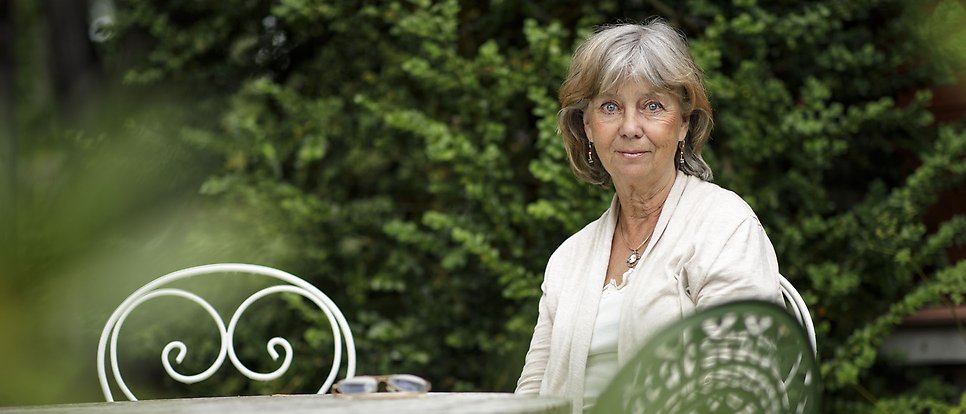Ylva Eggehorn new honorary doctor at Uppsala University

Ylva Eggehorn’s writing has occupied the space between culture, literature and philosophy of life. “I have always wanted to build linguistic bridges between different worlds that have become to some extent separated in our country”. Photo: Mikael M Johansson/Verbum Förlag
Hello Ylva Eggehorn, poet and author of fiction, plays and hymns, and now honorary doctor at the Faculty of Theology. What does this distinction mean to you?
“I feel grateful that what I have worked on for almost 60 years is being recognised. That means a lot!”
What is your relationship to Uppsala University?
“I studied theology when I was young at Stora Essingen in Stockholm, which at that time was part of Uppsala University. Then there’s another relationship that involves my grandfather who never got the chance to go to university. There’s a long history in my family of education and development that I find exciting. So many dreams of learning and flourishing, not all of which came true. That's why it feels particularly good to be one of the people the University has chosen to honour in this way.”
You have a rich body of work behind you, but how did you come to write hymns?
“Well, that wasn't really what I was aiming for when I was young. It was Anders Frostensson, who did a great deal of the updating of hymns in the 1970s, who nagged me when a new hymn book was scheduled to be published. I finally gave in and submitted four texts anonymously. The committee accepted all four right away, leading me to wonder ‘do they have such poor judgement, or is there just no competition, or what?’ I had respect for hymns even though I shared my contemporaries’ cultural, somewhat sublime disdain for that kind of poetry.”
How do you write a hymn?
“When I have writing weekends, I usually say ‘let's write the two most difficult genres there are’. One is a hymn and the other is a personal ad. In the personal ad you should say ‘I’ very clearly. You have to introduce yourself and be interesting, while being honest so that the person you meet is not disappointed. You can hear immediately that it’s impossible!
“Hymns have a different problem. When there’s an ‘I’ in a hymn, it’s really just a cover name for ‘we’. People of all different ages and from all kinds of backgrounds should be able to feel part of this 'I' as a 'we'. The hymn should also be theologically sound, have an artistic quality and not get bogged down in clichés. So yes, you can hear immediately that it’s impossible!”
But you've been pretty successful anyway. Your hymns have become very popular even among people who don’t usually go to church, for example “Be not afraid, there is a secret sign”.
“That one has archetypal imagery of a boat, sea, harbour and darkness. It is also filled with references to the Bible, but you don’t have to know them at all to sing it. And that's how I try to work.
“There was a woman who came up to me after a lecture and said, ‘I don't believe in God at all, but I see that you use a language which bridges the depths of experience so that we can cross it together’. That was a lovely analysis that describes the driving force of my entire writing career.”
The same hymn was sung at Phuket airport as coffins of the deceased were flown home to Sweden. What does it mean that your lyrics provide comfort in such difficult moments?
“Yes, that is a little surreal. But sometimes during an artist's career, you may produce something that’s a few sizes bigger than you are. Then it comes back to me too like a gift.”
Sandra Gunnarsson
Honorary doctor at the Faculty of Theology
From the award citation:
“Ylva Eggehorn is an author, poet and journalist who has spent her entire life working in the public sphere in the spirit of cultural theology. She has written over fifty published works in various genres: novels, short stories, poetry, plays, musical theatre, children’s books, non-fiction, educational materials and translations. Some of her own work has been translated into German, Danish, Dutch and English. Eggehorn has also written non-fiction books that clearly belong in the field of research on world views, such as 2004’s Att ta ansvar för Gud: om hängivenhet som motstånd (To take responsibility before God: On submission as resistance) in which she presents and discusses the texts and lives of Dietrich Bonhœffer and Etty Hillesum. What has won Eggehorn most fame and recognition in broader circles is perhaps her lyrics and hymns. In collaboration with various musicians, she has produced a treasury of musical lyrics that are used both in specifically church contexts and in our multicultural and secularised society. Her hymn “Var inte rädd, det finns ett hemligt tecken” (“Be not afraid, there is a secret sign”) was sung at Phuket Airport in connection with the tsunami disaster, every time a plane with Swedish coffins flew home.”
